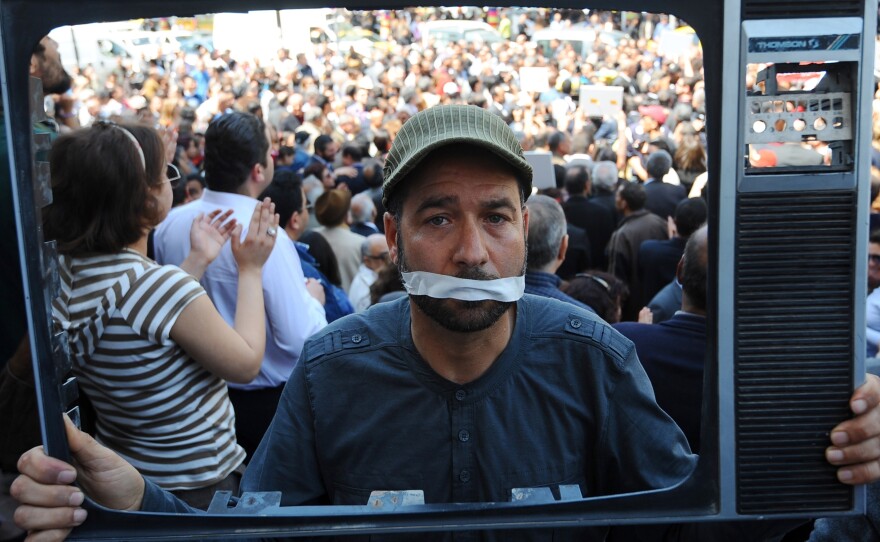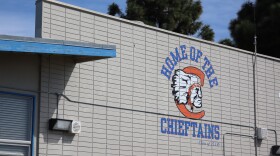Over the next couple weeks, NPR Morning Edition host Steve Inskeep will be taking a Revolutionary Road Trip across North Africa to see how the countries that staged revolutions last year are remaking themselves as they write new social rules, rebuild their economies and establish new political systems. Steve and his team will be traveling some 2,000 miles from Tunisia's ancient city of Carthage, across the deserts of Libya and on to Egypt's megacity of Cairo. In our first story, Eleanor Beardsley reports on how some taboos have been lifted in Tunisia, while others have cropped up in their place.
Nessma is one of Tunisia's most popular television stations, serving up sitcoms, sports, news and movies.
The station was founded five years ago by 49-year-old Tunisian entrepreneur Nabil Karoui. From his downtown Tunis office, Karoui says he often had to deal with censorship problems under the regime of dictator Zine al-Abidine Ben Ali, who ruled for more than two decades, before his ouster in the revolution of January 2011.
Tunisia is the laboratory of the Arab world. We are today addressing all the questions we should have addressed one century ago. We are negotiating our past, our common values, where are the red lines of the freedom of speech.
But that was nothing compared to what he's gone through since Tunisia's revolution.
Last October, on the eve of the country's first democratic poll, Karoui aired the film Persepolis, an animated depiction of a young girl's life at home and abroad after Iran's Islamic Revolution.
"I show the film, it was important," he says. "I did it on purpose, because it was a political choice, you know, and will make the people understand what it means when the Islamists take the power. You know, they didn't like it. I was expecting a reaction, but a political reaction, like things in the press. I never expected that I will live this nightmare."
The day after Persepolis aired, hundreds of fundamentalist Muslims, known as Salafists, attacked Nessma TV.
They also set fire to Karoui's house and burned his cars. The Salafists were angry over the film's depiction of God, considered a sacrilege in Islam.
Later, the Salafists took Karoui to court for violating moral values. Nessma lost the case in May and was ordered to pay a symbolic fine of $1,500. Karoui says the money is nothing, but he still plans to appeal.
Karoui is not the only member of the media to get into hot water lately. A newspaper editor was briefly jailed for publishing a picture of a scantily clad woman. And two bloggers were given seven-year prison terms for blasphemy on Facebook.
Seif Eddine Makhlouf is one of the lawyers who brought the case against Nessma. In his downtown office, a framed Quranic verse hangs over his desk. Makhlouf says he has no problem with free speech, but every society has its limits.
"In Germany, you can't draw the swastika. American has its Patriot Act," he says. "In Tunisia, you can attack the government, the president, any person. But you can't attack God, people's beliefs and what is sacred. This film was a kind of symbolic violence against the people."
Lotfi Ben Sassi is a well-known political cartoonist who had many brushes with the censor during the dictatorship. Tunisia's revolution, he says, has brought new taboos.
"But now it's religious censorship," he says, "because you know, when you speak about religion, it makes them crazy."

Since the country gained independence from France in 1956, Tunisian leaders have cracked down on those considered too religious. Many members of the moderate Islamist party that won last October's parliamentary elections were jailed and even tortured under those regimes.
Today, as people are free to practice their religion and to speak out, Tunisians are testing the waters, says Fares Mabrouk with the Arab Policy Institute.
"Tunisia is the laboratory of the Arab world," he says. "We are today addressing all the questions we should have addressed one century ago. We are negotiating our past, our common values, where are the red lines of the freedom of speech."
Ennahda, the moderate Muslim party that now leads the ruling coalition, insists it supports freedom of speech.
But critics say the party is trying to exert control over the media. For the first time, female TV announcers have been pressured to wear headscarves.
And Ennahda is accused of sponsoring sit-ins in front of the national radio and television network to press for more editorial control.
Nessma's Karoui says there is a fight going on for the soul of Tunisia.
"We never had this freedom before," he says. "Let me tell you, it's amazing. And we will fight to die to keep this freedom."
Copyright 2023 NPR. To see more, visit https://www.npr.org. 9(MDAzMjM2NDYzMDEyMzc1Njk5NjAxNzY3OQ001))







